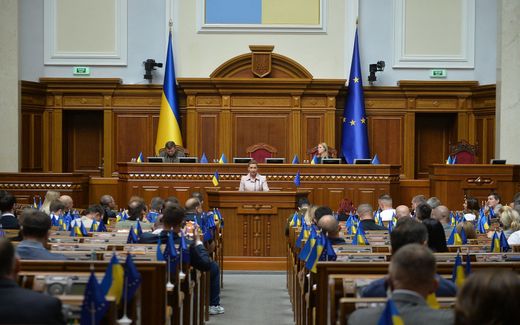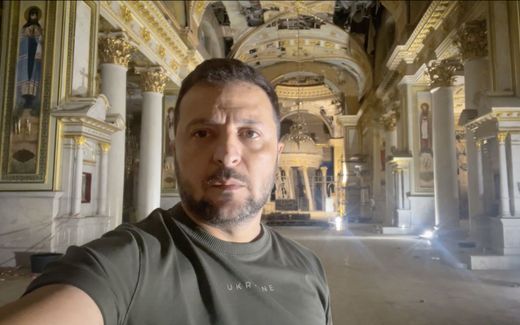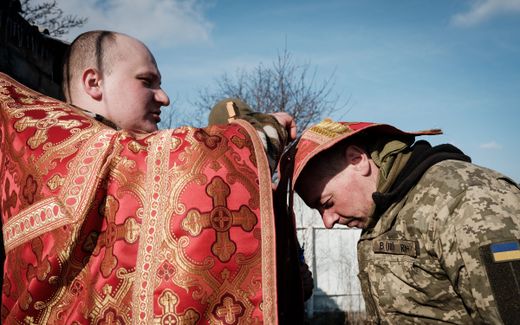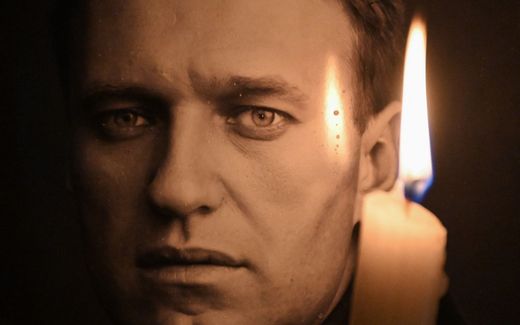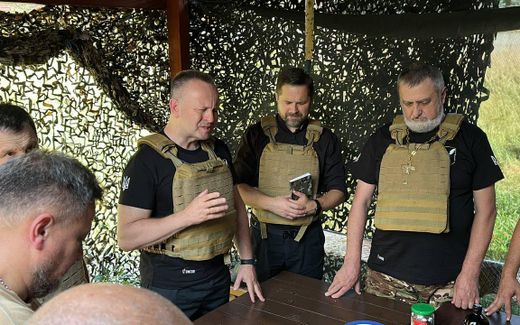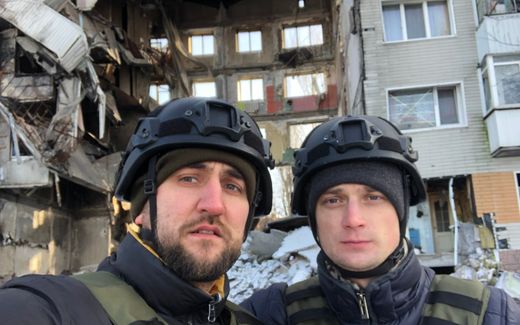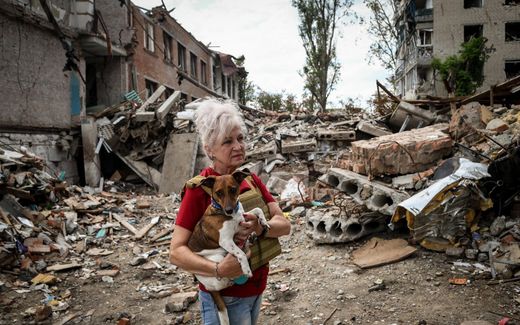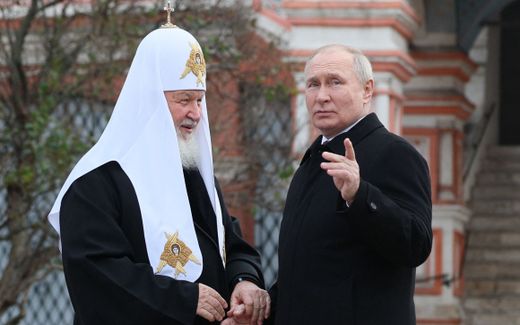Evert’s comment: Two years into the war, Kyiv’s church politics are still a threat to Ukraine
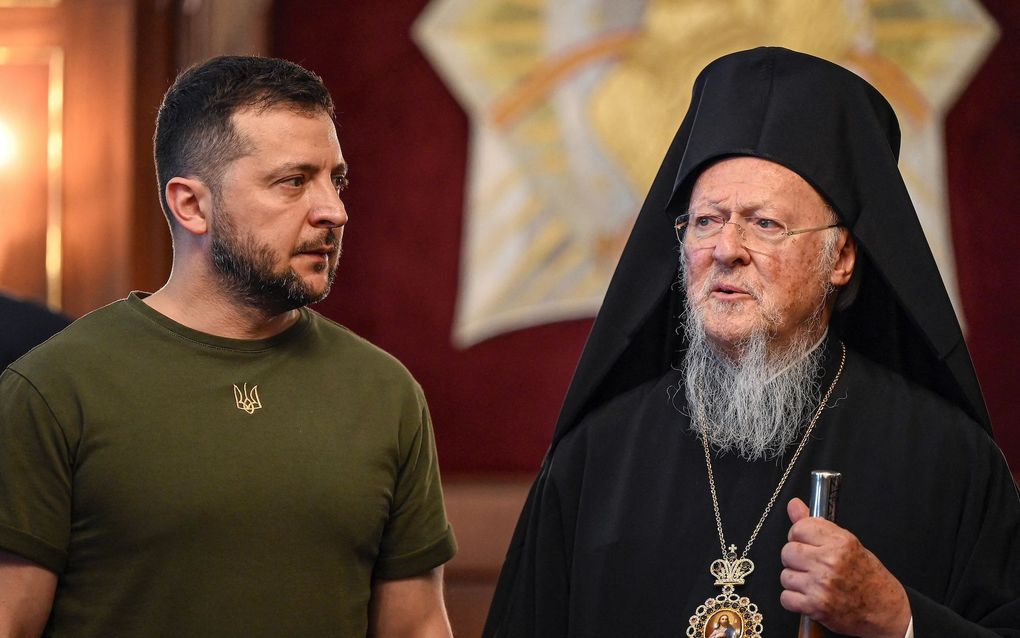
President Zelensky on a visit to the Ecumenical Patriarch in Istanbul last summer. Photo AFP, Ozan Kose
Eastern Europe
Volodymyr Zelensky must remember to defend all freedoms. One of them is religious liberty. Ukraine will never be really free without the Orthodox church – even when it belongs to the Moscow Patriarchate.
As a candidate for EU membership, Ukraine must be measured by Western standards. First, it has to fight against corruption. Second, it should stop intervening in church affairs.
Until now, people from the European Union have not given much attention to Ukraine’s church politics. In the Western mindset, the church is independent from the state. Although the precise set-up of the state and (state) church might differ from country to country, the church is free from state intervention. The church appoints its own leaders and works within the usual legal framework as the rest of the society.
But if EU people would look closely, they would see that Kyiv is in an active battle with the most prominent church body in the country: the Ukrainian Orthodox Church (UOC) of the Moscow Patriarchate (MP). It is the largest denomination in terms of parishes: more than 12,400. The ‘competing’ church, the newly formed Orthodox Church of Ukraine (OCU), has half of the number: 7,100 parishes. But in terms of believers, it is the other way around. The UOC consists of 13 per cent of the population, whilst the OCU has 34 per cent.
In the parliament, the Verkhovna Rada, President Zelensky tabled a bill that allows the state to liquidate a church in case it undermines national security. The precise church is not mentioned, but everybody understands this is about the UOC-MP.
The problem is that the UOC is linked with Moscow, the aggressor’s capital. Patriarch Kirill is not only the spiritual head of the Russian Orthodox Church (ROC) but also the ‘father’ of the UOC. The Ukrainian church is autonomous in almost all aspects. Still, the priests are expected to pray for Kirill during the Sunday liturgy. But Kirill sees the operation in Ukraine as a ‘holy war’.
In May 2022, a few months after the Russian invasion, the Synod of the UOC declared itself independent from the Moscow Patriarchate. The church’s leadership, Metropolitan Onuphry, had condemned the invasion from the start. And in the last two years, the church has actively supported the Ukrainian army. But there is still a lot of mistrust.
To a certain extent, this mistrust is understandable. Some clergy people have been found guilty of defending the Russian aggression against Ukraine in a criminal trial. The security services suspect that also the central church leadership in Kyiv is infected by the ideology of the Russian World. This refers to the idea that everyone who speaks Russian and has Russian culture and faith belongs to one entity. Becoming too Western and looking at NATO threatens this idea of unity. The invasion two years ago is a way to prevent Ukraine from breaking away from the Russian World.
Patriarch Kirill shares this idea of the Russian World with President Putin. And that’s why Kyiv sees a church affiliated with Kirill as a threat to national security.
That is understandable. But it is questionable whether this is realistic. The church connection between the two countries exists on paper only. If it were up to the church leadership in Kyiv, this tie would already have been cut. But it takes two parties to ‘divorce’, and the Moscow part does not give in yet. In the meantime, the church supports the Ukrainian territorial sovereignty.
But is it not true then that some church officials have been tried and found guilty of treason? Indeed, this is true. But suppose Ukraine has been able to convict those traitors. In that case, there is already enough legislation to fight against collaboration. There is no reason to de-legitimatise a whole church body to fight against the collaboration of a few.
Would it not be better if there were no churches with connections with Moscow then? Well, that would be much easier. But it is not the task of the state to organise the church. The ties between Ukraine and Russia have been there for centuries. That is why so many Ukrainians have Russian as their mother tongue, and Ukrainian and Russian are sister languages. Both countries have a shared and common history. This is the reality that we cannot change.
Something could change more quickly: the relationship between the state and the church. In most Orthodox cultures, separating politics and belief is difficult.
President Putin, for instance, can very well refer to a religious feeling in his politics. Historically, Kyiv is the cradle of Russian Orthodoxy and even the Russian state. It is not difficult for him to mobilise his people to defend ‘the’ Ukraine against the liberal West with its homosexuality and other decadent ideas. And although Mr Putin himself is not very religious, he can mobilise the religious system for his policy.
In the West, such a thing would be much more difficult. The churches have always been more independent from the state. The Roman Catholic Church, for instance, is even a worldwide body with its own international structures. During the ages, there have been moments when statesmen were afraid for the Catholic Church because of its connection with Rome and other foreign territories. But usually, Catholics were loyal citizens. Protestant churches have always been more or less nationally organised. But they always had international contacts independent from the government.
It is the same with the Jehovah’s Witnesses. In Western countries, they are free to evangelise within the limits of the law. But in Russia, they are forbidden as “foreign agents” and are seen as a threat to internal security.
Ukraine could leave the “Russian” style and choose this Western concept. That would imply leaving the church in its own domain. And if some clergy people collaborate with the enemy, well, go and get the perpetrators, but leave the church free. Let them decide for themselves whether they pray for the patriarch in Moscow or Istanbul or no patriarch at all.
Of course, this is Western European thinking. But it is also the idea on which the European Union is built. Freedom of religion is not absolute. But to curb it because of national security will raise eyebrows. That is what is done in many parts of the world. Freedom of religion will then become subject to national politics.
If Zelensky is willing to make progress with the EU membership, he has to give this a second thought. If not, this might hinder Kyiv’s candidacy for the EU.
Related Articles


